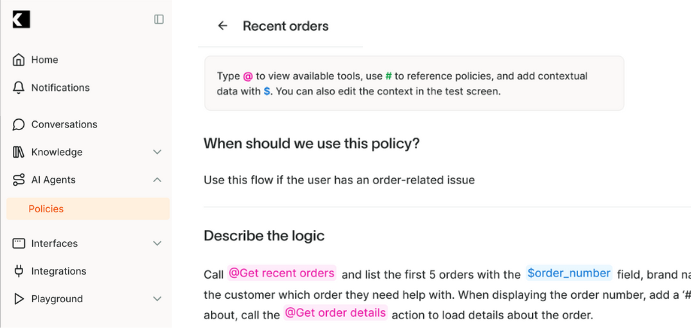Ingredients
Magento, Gladly, and Kodif.
What are AI Policies?

At Kodif, we’re excited to announce the launch of Policies—a powerful, dynamic solution designed to revolutionize the way CX managers handle customer support. Unlike traditional flows, which are rigid and complex, Policies empower non-technical users to create and manage customer interactions with ease. Written in natural language, Policies make it simple to define and refine customer experiences without needing to rely on complicated flowcharts or scripting. This approach is not only user-friendly but also self-serve, enabling CX teams to quickly translate existing Standard Operating Procedures (SOPs) into automation, saving valuable time and resources.
The flexibility of Kodif Policies ensures that businesses can offer personalized, context-driven support while continuously improving customer experiences. With Policies, you can experiment with different strategies to optimize outcomes such as CSAT, revenue, and retention—all without the need to rebuild complex workflows. Whether it’s automating routine interactions or testing new approaches for high-stakes scenarios, Policies provide a scalable, adaptable solution that aligns with your business goals. While flows still have their place in sensitive, high-risk situations, Policies offer an agile alternative that helps businesses innovate faster and deliver exceptional, tailored experiences at scale.
“Refund order” ticket type explained
A “Refund order” ticket type in customer support refers to requests initiated by customers seeking a refund for their purchase. These tickets are critical as they directly impact customer satisfaction and trust. Handling refund requests efficiently involves verifying order details, eligibility based on return policies, and processing the refund through the appropriate payment channels. A well-managed refund process ensures that customers feel valued and are more likely to return for future purchases, even when their initial experience did not meet expectations.
Which Platforms does this AI policy work on?
This AI policy seamlessly integrates with Magento, Gladly, and Kodif, offering robust support for handling refund processes. Furthermore, Kodif is designed to integrate with all other major platforms, ensuring broad compatibility and flexibility across different e-commerce ecosystems.
When should I use this policy?
This policy should be used when customers request a refund for their order. It streamlines the process by automating the verification of orders, checking refund eligibility, and initiating the refund process, thereby enhancing efficiency and customer satisfaction.
Policy logic
-
Ask for the user’s email address
a. Use @get_magento_account_details to check if the user with that email address exists in Magento.
b. If the email address was not found, ask for a valid email address.
c. If the email address is still not found, route it to an agent for further investigation. -
Display Recent Orders
a. Use @get_magento_orders to retrieve the user’s recent orders.
b. Display the list of recent orders and ask the user which specific order they would like to inquire about.
c. If the order was not found, route to an agent for further investigation. -
Check Refund Eligibility:
a. Use @magento_order_details to check the status and eligibility of the selected order for a refund.
b. If the order is eligible for a refund, verify the return and refund conditions (e.g., within the return window, product condition, etc.).
c. If the order is not eligible, inform the user that the order is outside the refund window or does not meet the conditions for a refund, and provide alternative options (e.g., store credit, exchange). -
Initiate Refund Process
a. If the order meets the refund criteria, ask the user to confirm their request for a refund.
b. Use @magento_issue_refund to initiate the refund process in Magento.
c. Inform the user that the refund process has started, and provide them with an estimated timeline for when the funds will be credited back to their payment method (typically within 3-5 business days). -
Notify the User
a. Inform the user in the chat that their refund has been successfully initiated.
b. Magento will send a confirmation email to the user regarding the refund status and details. -
Refund Follow-Up
a. Advise the user to check their bank or payment provider for any updates on the refund processing timeline.
b. If the user has questions regarding the refund status after the estimated time frame, encourage them to reach out for further assistance. -
Escalation
a. If the refund cannot be processed or if there are any issues, route the request to an agent or create a ticket for further investigation.
b. If the user prefers a store credit or exchange instead of a refund, offer these options and use the appropriate tools to process them.
Example policy
This example policy showcases how to efficiently handle refund orders with the integration of Magento, Gladly, and Kodif. By following the logic outlined above and utilizing the specific tools and commands, businesses can ensure a smooth and customer-friendly refund process.


